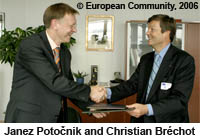INSERM adopts European Charter for Researchers
The French National Institute for Health and Medical Research (INSERM) has officially announced its backing of the European Charter for Researchers and the Code of Conduct for the Recruitment of Researchers, committing itself to applying their principles to its human resources management for researchers and scientific employment. The adoption by INSERM of the Charter and Code was formalised through the signing of a joint statement by Christian Bréchot, Director General of INSERM, and EU Science and Research Commissioner Janez Potocnik on 3 May. Published by the European Commission in March 2005, the Charter and Code of Conduct are considered to be key initiatives in the EU's policy to help increase the number of researchers in Europe, and to stimulate economic and employment growth. While the Charter addresses the roles, responsibilities and entitlements of researchers and their employers or funding organisations, the Code seeks to improve recruitment, to make selection procedures fairer and more transparent, and proposes different means of judging merit. 'The aim is to provide a level playing field for European research and to give individual researchers the same rights and obligations wherever they work throughout the EU,' Commissioner Potocnik told CORDIS News. In doing so, the initiatives will help to 'increase and perpetuate the attractiveness of Europe for scientific careers at all stages, from post-doctorate to senior positions, through the recognition of a genuine 'European career',' the joint statement reads. By subscribing to the initiatives, the statement says, 'INSERM both contributes to the building of the European Research Area in the frame of the Lisbon strategy and strongly supports the European Commission to promote the attractiveness of research careers in Europe and the development of all forms of mobility.' Created in 1964, INSERM is the only French public research body entirely dedicated to human health. It has 13,000 employees, including 6,000 researchers, working in some 360 research units located all over France, focusing on the study of all diseases. INSERM's principal mission is to facilitate exchange between basic and clinical research, therapeutic or diagnostic research, and public health research. In order to fulfil this mission, the institute works in close partnership with other public or private research institutions and care centres such as hospitals and universities. 'INSERM's endorsement of the Charter and Code is an important one,' said the Commissioner, 'because the immediate success of the two initiatives depend on the readiness of Member States and national research bodies to take them forward.' Since their publication, so far a total of 123 funding bodies, including national governments, public institutes and universities from eight EU countries and Switzerland, have agreed to implement Charter and Code. According to Mr Bréchot, the Charter and Code offer win-win outcomes for France and other Member States, as well as researchers: 'They will provide a means to engage France in a new way of thinking about career tracks for researchers that is more flexible and transparent, as well as the framework for countries in which to make the changes needed to move forward.' Recognising the need for greater mobility, INSERM has already begun to implement 'incentive measures' for mobility in Europe and abroad. One such measure is what it calls 'interface contracts' for investigators and research engineers, which combine permanent positions and temporary contracts. They enable INSERM researchers to work full time for a period of one to five years on high-excellence projects in a partner research institute, hospital or university located outside of France, in Europe or elsewhere, all the while retaining their permanent position and salary at INSERM. The value of such contracts, INSERM claims, is manifold. Not only will the contracts ensure continuum from basic and applied research, attract technology transfers and translational research. They will also give researchers a sense of security and permanency, while at the same time allowing them the flexibility to gain new skills and know-how.
Countries
France

